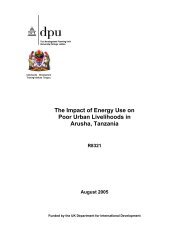EPA Review Annex Documents - DFID
EPA Review Annex Documents - DFID
EPA Review Annex Documents - DFID
Create successful ePaper yourself
Turn your PDF publications into a flip-book with our unique Google optimized e-Paper software.
Since domestic constituencies tend to care more about adjustment costs over trade<br />
creation, a key issue in the short run for policy makers is the impact on exports from<br />
losing Cotonou. This is difficult to calculate because it depends on the amount of exports<br />
that were effectively using Cotonou and that could not export without using the<br />
preference. At the same time the gains from GSP+ depend on the impact of reducing<br />
tariffs on those products that used preferences. Regarding GSP+, publicly available data<br />
from COMEXT suggests that only 3.5% of exports used preferences in 2007, and,<br />
therefore, the improvement of preferences would impact mainly these products by<br />
having better access. 94 More concretely, the case study reflects the specific interest in<br />
improved access via GSP+ of producers of: textiles, tuna, cocoa, cocoa product6s, hides<br />
and skins of goats and lambs, shrimps and prawns, crabs, leather and rubber. In<br />
addition, COMEXT data suggests that while exports increased substantially for Nigeria<br />
from 2007 to 2008, they did so for products with zero MFN rates, and the share of<br />
exports under preferential access was reduced to 1.9%. Therefore there has been a<br />
reduction in exports under preferential access of around €65 that may be partly<br />
associated to the loss of Cotonou preferences. Regarding exports under <strong>EPA</strong>s,<br />
Fontagne et al (2008) estimate from ECOWAS an increase in 4% of the volume of<br />
exports compared to GSP. This would be a substantial benefit of <strong>EPA</strong> that would add to<br />
trade creation. Overall, the potential benefits arising from <strong>EPA</strong>s are much larger than<br />
any other options, especially when compared with the costs of staying only with GSP.<br />
Table 10 Counterfactual costs (millions)<br />
<strong>EPA</strong> GSP + GSP<br />
Negotiating costs a<br />
$0.287 0 0<br />
Impact on exports d<br />
(+4% of export<br />
volume) b<br />
(+3.5% of<br />
€65<br />
exports)<br />
Trade creation b<br />
($617) 0 0<br />
Revenue loss c<br />
€155 0 0<br />
Employment<br />
€100 0 0<br />
Adjustment c<br />
Other issues (trade,.) Potentially large<br />
benefits especially in<br />
services<br />
0 0<br />
Source : a Own calculations, b Karingi et al (2005), c Miner (2006) d Fontagne et al. (2007)<br />
Comparison with WTO<br />
Nigeria has certainly allocated more resources to the WTO than to <strong>EPA</strong> process. The<br />
costs for 2009 of maintaining the office in Geneva, considering all costs was $2.4<br />
million, which is several times the amount that has been spent on the <strong>EPA</strong> negotiations<br />
so far. Directly comparable to the <strong>EPA</strong> costs is the personnel cost which is $787,027.9,<br />
also many times more than the <strong>EPA</strong> costs so far. 95<br />
94 It is possible that a better preference margin under GSP+ may create exports of new products;<br />
however, this is impossible to clarify with the existing data.<br />
95 The differential in the costs has been a sensitive and worrisome issue for Nigeria’s<br />
parliamentarians in particular with the extreme position canvassed that Nigeria should pull out of<br />
the WTO not only because of the high annual budgetary provision but also for the reason that the<br />
benefits cannot be tangibly perceived. Despite the public dislike of WTO, as is with the <strong>EPA</strong>,<br />
Nigeria is more committed to the WTO and believes the WTO will offer more trade gains than the<br />
74
















